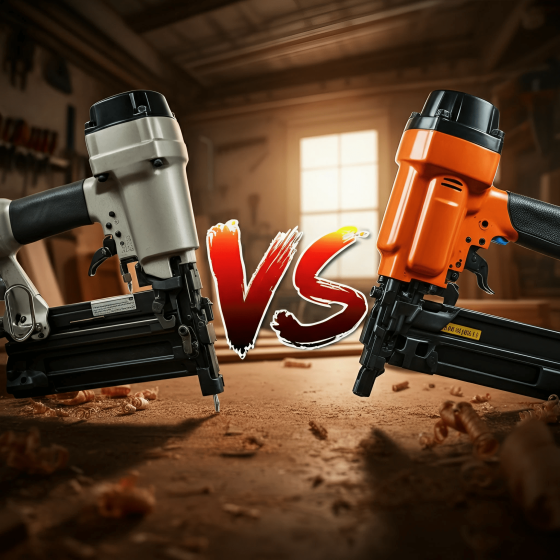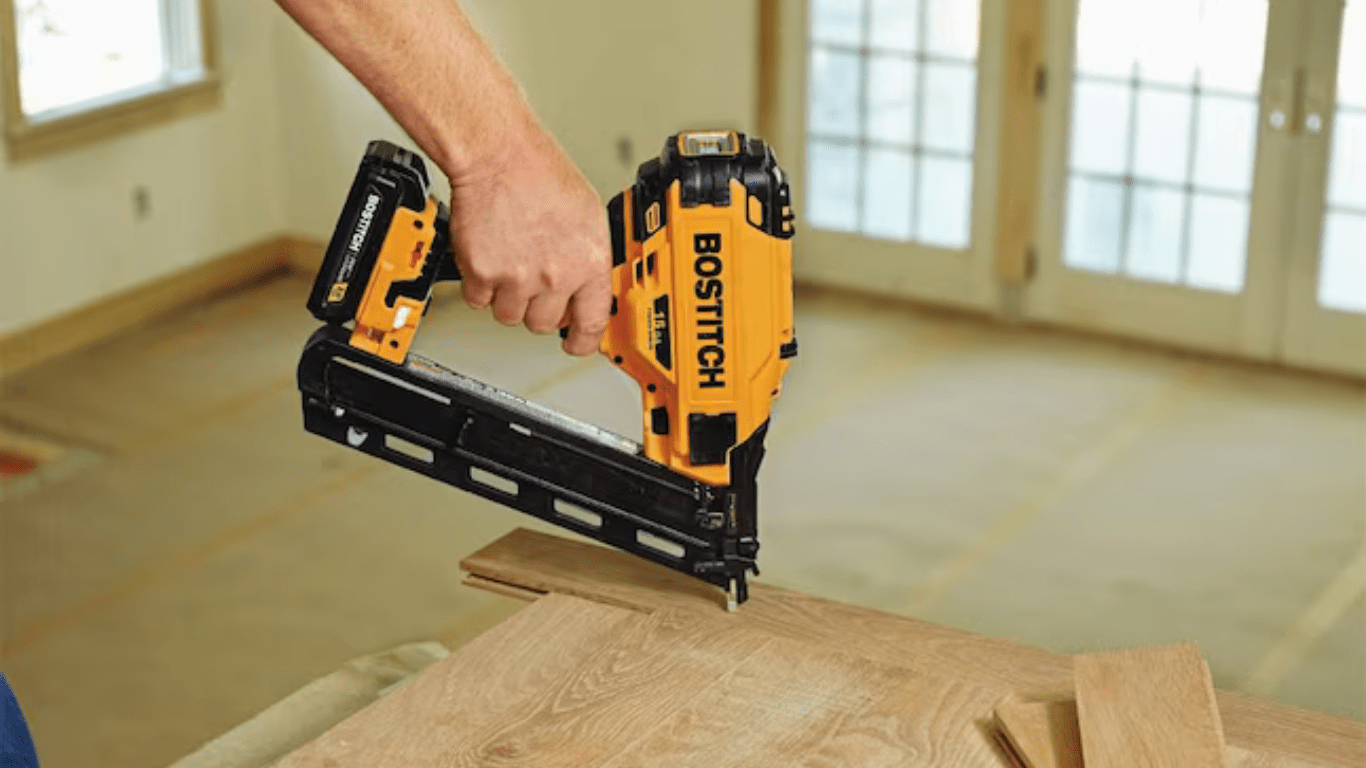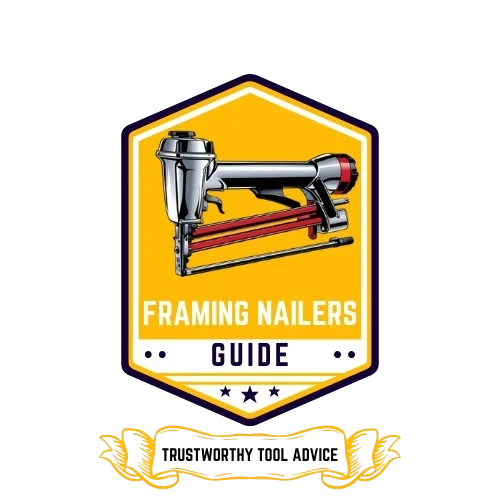
Table of Contents
Last Updated on December 1, 2024 by John Patterson
Whether you’re taking on woodworking or home improvement projects, the right tools make all the difference—and that goes for nail guns, too. With the various nail guns available, hobbyists and professionals alike often ask one question, “Which one should I choose, 15-gauge or 16-gauge nail gun?”
In this blog post, we explain the difference between 15-gauge and 16-gauge nail guns, their best uses, pros, cons, and features. And by the time you’re done reading, you’ll know exactly which type of nail gun you need for your next project.
15 Gauge and 16 Gauge Nail Gun Overview
But before we get into the nitty-gritty, we need to understand what the gauge measurement is. The “gauge” is the thickness of the nails the nail gun drives. Lower gauge = thicker nail; higher gauge = thinner nail.
What Is a 15-Gauge Nail Gun?

A 15-gauge nail gun is a professional-grade nail gun built for 15-gauge nails, which are thicker and stronger than 16-gauge nails. This type of nail gun is typically preferred for tough applications that require additional holding power or for projects involving heavy or dense materials.
15-Gauge Nail Guns — Overview
15-gauge nail guns are robust tools built to drive wide, heavy-duty nails. However, sometimes they are simply better suited for a particular kind of application; for instance building something really heavy, or using real thick baseboards, etc.
Features of 15-Gauge Nail Guns
- Nail Thickness: 1.8 mm diameter (thick nails).
- Angled: Most 15-gauge nail guns have angled magazines, which makes them easier to use in tight spaces.
- Nail Length: Usually fits nails from 1-1/4 in to 2-1/2 in.
- Applications: Great for heavy carpentry work such as crown molding, large baseboards, hardwood flooring, and furniture making.
Though capable and adaptive, 15-gauge nail guns are often thicker and heavier than other types of nail guns and for some, prove tiring to use for long periods of time.
Finally, if you need power, then a 15-gauge nail gun is your answer.
15 gauge nail Gun Uses:
Here is what to do with a 15-gauge nail gun:
- Add crown molding, chair rails and baseboards.
- You can put large trims and heavy moldings.
- Making door and window casings.
- Attaching heavier are hardwood or dense table top.
- Projects where high holding power is important.
15-Gauge Nail Gun Best For
- Great for cabinetry and woodworking projects.
- Appropriate for Use on Thicker, Heavier Construction Materials
15-Gauge Nail Gun Pros
- My nails are thicker than the average person’s, so I can hold things better.
- The angled design provides access to tight corners and difficult spaces.
- Designed to accommodate larger logs.
- Does great on wood floors or other dense material.
15-Gauge Nail Gun Cons
- Heavier and bulkier, so less quick-moving for small jobs.
- Leaves bigger nail holes, so more work for you in filling and finishing.
- More expensive than 16-gauge nail guns and nails.
What Is a 16-Gauge Nail Gun?

A 16-gauge nail gun is a more versatile tool suited for medium-duty jobs and uses thinner nails than the 15-gauge type. The smaller nails also make this useful for projects that require some finesse and a cleaner looking finish.
16-Gauge Nail Guns — Overview
16-gauge nail guns, by contrast, use thinner nails and are lighter weight. They are ideal for medium-duty projects where accuracy and fineness are important, like trimming or light molding.
Buying a 16-Gauge Nail Gun — Main Features
- Nail Thickness: 1.6 mm diameter (thinner nails)
- You can get straight or angled cut design as per your need of the project.
- Nail Length: Generally accommodates nails from 3/4 inch to 2-1/2 inches long.
- Applications: Excellent for lighter trim work, cabinetry, paneling, and thin crown molding.
In relation to 15-gauge nailers when 16-gauge alternatives are smaller, more portable, and easier to use, especially for beginners or hobbyists.
When You Should Use a 16-Gauge Nail Gun?
Uses of 16-gauge nail gun:
- Adding delicate trim and molding.
- Installing baseboards or crown molding if a finer finish is desired.
- Furniture assembly and light furniture repairs
- Or projects where smaller, less noticeable nail holes happy.
16-Gauge Nail Gun Best For
- Best of Class for Medium Duty Woodworking and Decorative Applications
- Great for applications that leave a seamless and dressed look.
16-Gauge Nail Gun Pros
More lightweight and compact, making it easier to manage.
- Only slightly holes a nail, means less filling and sanding.
- Also cheaper for nails and nail gun choices.
- Great versatility—works well with small as well as medium projects.
16-Gauge Nail Gun Cons
- Is not as strong as thicker 15-gauge nails.
- Does not do great on heavy-duty tasks or dense hardwood materials.
- Nails tend to bend or split under heavy loads.
Which One to Select: 15 Gauge vs 16 Gauge Nail Gun

Determining whether to go for a 15-gauge or 16-gauge nail gun really comes down to your specific requirements and the type of projects that you intend to work on. Here’s how to decide:
Choose a 15-Gauge Nail Gun If:
- You’re doing tough jobs that call for maximum holding power.
- You have to penetrate thicker or heavier materials such as door frames or hardwood.
- You’re fine with the larger nail holes that will need more finishing work.
Choose a 16-Gauge Nail Gun When:
- You’re taking on medium-duty projects, e.g., light trim or cabinetry.
- You want a cleaner finish with smaller, less noticeable nail holes.
- You require portability, and simplicity.
Comparison Table
| Feature | 15-Gauge Nail Gun | 16-Gauge Nail Gun |
|---|---|---|
| Design | 35-degree guys for compressed spaces. | Available in straight & angled designs. |
| Nail Length | 1-1/4" to 2-1/2". | 3/4" to 2-1/2". |
| Strength | Ideal for heavy duty projects more stronger hold. | For light projects, moderate strength |
| Portability | On the heavier side; for long enough use may fatigue | More lightweight and user-friendly. |
| Surface Impact | Big holes upm bod filler. | Lesser holes, subtle appearance. |
| Price Range | Generally more expensive. | Slightly more affordable. |
| Nail Thickness | 1.8 mm (much thicker, stronger nails). | 1.6 mm (thinner & lighter nails). |
| Applications | There is heavy trim, crown moulding, furniture building. | Light trim, cabinetry and paneling |
Frequently Asked Questions
Can a 16 gauge nail gun use 18 gauge nails?
No, you cannot use 18-gauge nails in a 16-gauge nail gun. Some differences in thickness mean nail gun sizes are for the gauge they take. Nails should always be compatible with your tool.
How do you load a Rigid 16-gauge nail gun?
This is how to load a Rigid 16-gauge nail gun:
- Make the power off or removethe battery for safety.
- Push back the magazine latch at the rear of your nail gun.
- Load the magazine with 16-gauge nails, pointed side up.
- Close the latch and test the metal on a scrap wood.
How to load a Ryobi 16 gauge nail gun?
How to load a Ryobi 16-gauge nail gun:
- Disconnect the battery or air compressor just for safety.
- Open the magazine at the gun’s bottom.
- Load the magazine with a strip of 16-gauge nails.
- Rewind the magazine and reinstall the power cord for operation.
Two basic types of nail guns can be used with different types of nails.
Although it can be done, it is not a good idea to fire a nail gun directly into drywall. Nails don’t grip well enough in drywall. Screws with a drill for anchoring of drywall.
Is 15-or 16-gauge nail gun better for crown molding?
Either will work for crown molding. A 15-gain nail gun for larger crown moldings or harder materials, and a 16-gain nail gun for smaller, finer moldings with less finishing needed.
How to Choose the Right Nail Gun?
Review the Project Requirements
Think about the exact requirements of your project. Building a deck or furniture, for example, may need a more powerful 15-gauge nail gun. For smaller jobs, like wainscoting or thin crown molding, a 16-gauge option might be perfect.
Check Nail Compatibility
You’ll want to make sure that the nail gun you purchase is compatible with the nails you’ll be using regularly.
Test for Comfort
Nail guns are not all created equal as far as weight and design, so if you can hold or operate one beforehand, do it to see if it will be comfortable to use for extended periods.
Budget Wisely
Although their price point tends to be on the higher end, 15-gauge nail guns deliver strength and durability that may make the investment worth it if you take on heavy-duty projects often. For lighter and more versatile work, a 16-gauge nailer may be a better value.
Choose the Right Nail Gun for Your Needs
The best nail gun for you can make or break your DIY or home improvement project. The 15-gauge nail gun is preferable for heavy-duty jobs and for ultimate holding power, while the 16-gauge nail gun is desirable if precision and a cleaner finish are important.
Want more recommendations or analytical insights? Check out our tool guides or leave your question in the comments section below. The only limit to what you can create is the tool that you choose!

